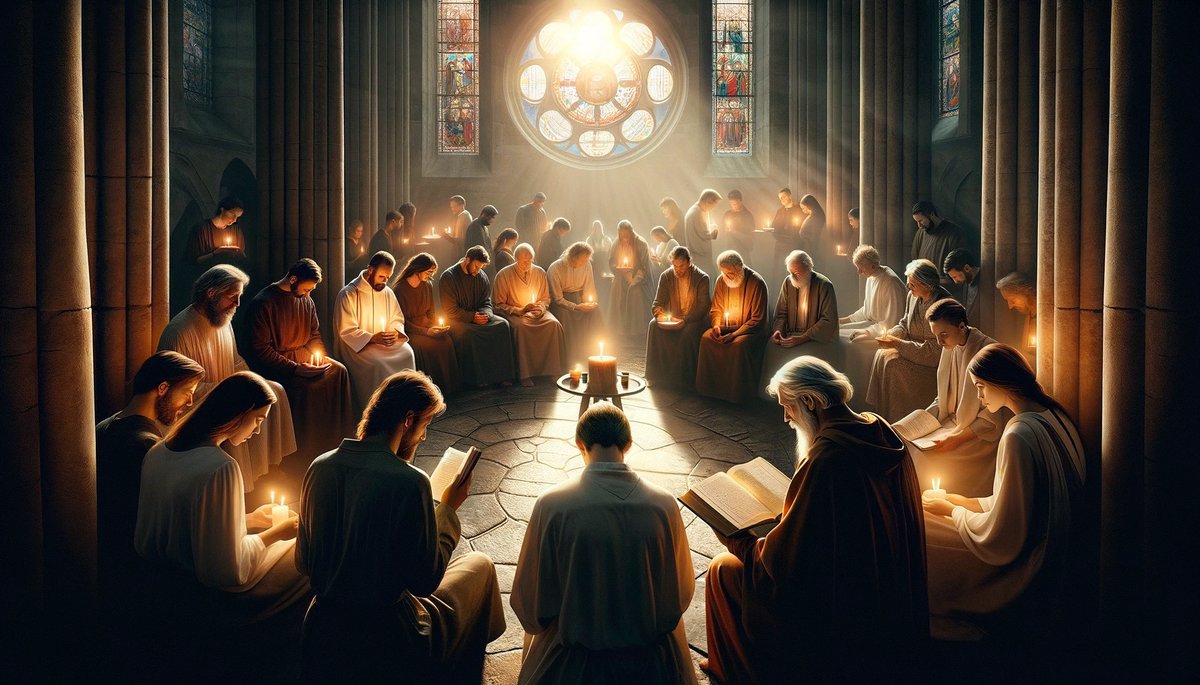Home>Special Themes>How Do We Prepare For Advent


Special Themes
How Do We Prepare For Advent
Published: February 14, 2024
Jason DeRose, Managing Editor at Christian.net, uses his expertise in religion and journalism to deepen understanding of faith's societal impacts. His editorial leadership, coupled with a strong academic background, enriches the platform’s diverse content, earning him recognition in both journalism and religious circles.
Prepare for Advent with our special themes and activities. Discover how to make the most of this sacred time of anticipation and reflection. Join us in celebrating the season with joy and purpose.
(Many of the links in this article redirect to a specific reviewed product. Your purchase of these products through affiliate links helps to generate commission for Christian.net, at no extra cost. Learn more)
Table of Contents
Introduction
Advent, a time of anticipation and preparation, holds a significant place in the Christian tradition. As the word "advent" itself suggests, it is a period of expectant waiting and readiness for the celebration of the birth of Jesus Christ. This sacred season marks the beginning of the liturgical year in many Christian denominations and is observed with great reverence and joy.
The weeks leading up to Christmas are a time for believers to reflect on the profound meaning of Christ's coming into the world. It is a time to rekindle the spiritual flame within, to renew one's faith, and to prepare the heart to welcome the arrival of the Savior. The anticipation of Advent is not merely a countdown to Christmas; rather, it is a spiritual journey that invites individuals to delve into the deeper layers of their faith and embrace the timeless message of hope, love, joy, and peace.
During this season, the focus is not only on the historical event of Jesus' birth but also on the anticipation of his second coming. It serves as a reminder of the promise of redemption and the ultimate fulfillment of God's plan for humanity. The themes of Advent—hope, love, joy, and peace—resonate deeply with the human spirit, offering solace and inspiration in a world often fraught with challenges and uncertainties.
As we embark on this sacred journey of Advent, it is an opportune time to pause, reflect, and realign our priorities. It is a time to seek spiritual nourishment, to cultivate a spirit of gratitude, and to prepare our hearts to receive the blessings of the season. The traditions and practices associated with Advent provide a framework for believers to engage in meaningful rituals and contemplative activities that foster a sense of connectedness with the divine and with one another.
In the subsequent sections of this article, we will delve deeper into the profound significance of Advent in the Christian tradition, explore spiritual practices that aid in preparation for this sacred season, and discuss practical ways to infuse the spirit of Advent into our daily lives. Let us embark on this enlightening journey of discovery and spiritual enrichment as we prepare to embrace the beauty and meaning of Advent.
Read more: How To Prepare For Advent
Understanding the Meaning of Advent
Advent, derived from the Latin word "adventus," meaning "coming" or "arrival," encapsulates the essence of hopeful anticipation and spiritual preparation. This sacred season, observed in various Christian traditions, serves as a poignant reminder of the profound significance of Christ's birth and the anticipation of his second coming. Lasting four weeks, Advent symbolizes a period of expectant waiting, reflection, and spiritual readiness.
At its core, Advent embodies a dual significance. Firstly, it commemorates the historical event of Jesus Christ's birth in Bethlehem over two millennia ago. This momentous occasion, heralded by angels and celebrated by shepherds, marked the incarnation of God's love and grace in human form. The birth of Jesus, the promised Messiah, represents the fulfillment of ancient prophecies and the dawning of a new era of salvation and redemption for humanity.
Secondly, Advent serves as a poignant reminder of the anticipation of Christ's second coming, as foretold in Christian scripture. It symbolizes the hopeful expectation of the fulfillment of God's divine plan and the ultimate restoration of all creation. This dual focus on the past and future aspects of Christ's coming imbues Advent with a profound sense of continuity, emphasizing the timeless nature of God's love and the enduring hope it offers to believers.
The symbolism of Advent is encapsulated in the lighting of the Advent wreath, a cherished tradition in many Christian households and congregations. The wreath, adorned with four candles, represents the four weeks of Advent. Each candle, lit successively on the four Sundays leading up to Christmas, signifies the themes of hope, love, joy, and peace, respectively. As the light grows with each passing week, it symbolizes the increasing anticipation and brightness that Christ's coming brings into the world.
Furthermore, the color purple, often associated with royalty and penitence, is prominently featured during Advent. This color symbolizes the solemn yet hopeful nature of the season, inviting believers to engage in introspection, repentance, and spiritual preparation. In some traditions, a pink candle is lit on the third Sunday of Advent, known as Gaudete Sunday, signifying joy and rejoicing as the anticipation of Christ's birth intensifies.
In essence, Advent encapsulates the profound message of hope, love, joy, and peace, inviting believers to embark on a spiritual journey of introspection, anticipation, and preparation. It serves as a poignant reminder of the enduring significance of Christ's coming and the transformative power of his love in the lives of believers. As we delve deeper into the essence of Advent, we gain a deeper appreciation for the timeless message it embodies and the spiritual nourishment it offers to the human soul.
Reflecting on the Significance of Advent in Christian Tradition
The significance of Advent in the Christian tradition extends far beyond the mere anticipation of Christmas. It serves as a profound reminder of the foundational tenets of the Christian faith and the enduring message of hope, love, joy, and peace. As believers embark on this sacred journey of Advent, they are invited to reflect on the timeless significance of this season and its deep-rooted impact on their spiritual lives.
Advent holds a central place in the liturgical calendar of many Christian denominations, marking the beginning of the ecclesiastical year. It serves as a period of spiritual preparation, inviting believers to engage in introspection, prayer, and contemplation. The four-week duration of Advent aligns with the themes of hope, love, joy, and peace, symbolized by the lighting of the Advent wreath. This ritualistic practice serves as a visual representation of the spiritual journey that believers undertake during this season.
Reflecting on the significance of Advent allows individuals to delve into the rich tapestry of Christian history and tradition. It provides an opportunity to reconnect with the timeless narratives of the Nativity, the prophecies foretelling the coming of the Messiah, and the profound impact of Christ's birth on humanity. Through this introspective journey, believers are reminded of the enduring relevance of the Christmas story and the transformative power it holds in their lives.
Moreover, the significance of Advent extends beyond historical remembrance; it embodies a message of profound hope and anticipation. It serves as a poignant reminder of the promise of Christ's second coming and the ultimate fulfillment of God's redemptive plan. This dual focus on the past and future aspects of Christ's coming infuses Advent with a sense of continuity, emphasizing the enduring nature of God's love and the unyielding hope it offers to believers.
In the Christian tradition, Advent also serves as a time of spiritual renewal and reawakening. It provides a sacred space for believers to realign their priorities, seek forgiveness, and cultivate a spirit of gratitude. The introspective nature of this season encourages individuals to examine their faith journey, nurture a deeper connection with the divine, and prepare their hearts to receive the blessings of the Christmas season.
As believers reflect on the significance of Advent, they are reminded of the profound impact of Christ's birth on the world and the enduring relevance of his message of love and redemption. This period of reflection fosters a sense of spiritual connectedness and solidarity among believers, uniting them in the shared anticipation of the Savior's arrival. Ultimately, the significance of Advent in the Christian tradition transcends mere historical observance; it embodies a timeless message of hope, love, and spiritual renewal, inviting believers to embark on a transformative journey of faith and anticipation.
Spiritual Practices to Prepare for Advent
The sacred season of Advent offers a profound opportunity for believers to engage in spiritual practices that foster introspection, anticipation, and preparation for the celebration of Christ's birth. These practices serve as transformative tools, guiding individuals on a journey of spiritual renewal and deepening their connection with the divine. As believers prepare to embrace the beauty and significance of Advent, several spiritual practices can enrich their experience and cultivate a sense of reverence and anticipation.
1. Prayer and Contemplation
Central to the preparation for Advent is the practice of prayer and contemplation. Through prayer, believers seek solace, guidance, and spiritual nourishment as they prepare their hearts to welcome the Savior. Contemplative prayer allows individuals to enter into a sacred space of introspection, fostering a deeper connection with the divine and creating a sense of inner peace and tranquility.
2. Scripture Reading and Reflection
Engaging in the reading and reflection of sacred scriptures related to the Nativity story and the prophetic anticipation of Christ's coming is a spiritually enriching practice during Advent. Delving into the timeless narratives of the birth of Jesus and the prophetic promises of the Messiah fosters a sense of anticipation and reverence, deepening one's understanding of the profound significance of Christ's birth.
3. Advent Wreath Ritual
The lighting of the Advent wreath, accompanied by prayers and reflections, is a cherished tradition that symbolizes the themes of hope, love, joy, and peace. Each week, as a new candle is lit, believers are reminded of the increasing anticipation and brightness that Christ's coming brings into the world. This ritual serves as a visual representation of the spiritual journey of Advent, fostering a sense of connectedness and anticipation.
4. Acts of Compassion and Kindness
Embracing acts of compassion and kindness towards others is a meaningful way to prepare for Advent. Engaging in charitable deeds, extending a helping hand to those in need, and fostering a spirit of generosity align with the themes of love and goodwill that characterize the Christmas season. Such acts of kindness not only enrich the lives of others but also cultivate a spirit of empathy and compassion within the individual.
5. Silence and Solitude
Amidst the hustle and bustle of the holiday season, carving out moments of silence and solitude is essential for spiritual preparation. Embracing moments of quiet reflection allows believers to center themselves, seek inner clarity, and create space for a deeper connection with the divine. In the stillness of solitude, individuals can cultivate a spirit of receptivity and anticipation for the blessings of Advent.
Read more: Why Do We Celebrate Advent?
6. Participation in Advent Services
Engaging in Advent services, such as prayer vigils, liturgical celebrations, and communal gatherings, provides believers with a sacred space to immerse themselves in the anticipation of Christ's birth. These services offer opportunities for communal prayer, reflection, and the sharing of spiritual insights, fostering a sense of unity and shared anticipation among believers.
By embracing these spiritual practices, believers can embark on a transformative journey of preparation for Advent, nurturing a spirit of reverence, anticipation, and spiritual renewal. These practices serve as guiding lights, illuminating the path towards a deeper connection with the divine and a profound appreciation of the timeless message of hope, love, joy, and peace that Advent embodies.
Practical Ways to Prepare for Advent in Daily Life
As believers embark on the sacred journey of Advent, the integration of spiritual practices into daily life serves as a transformative means of preparing the heart and mind to embrace the significance of Christ's birth. Practical ways to infuse the spirit of Advent into daily life encompass a harmonious blend of mindful actions, intentional reflections, and acts of compassion that resonate with the themes of hope, love, joy, and peace.
1. Cultivating Daily Reflection
Incorporating moments of reflection into daily routines allows individuals to pause, contemplate, and realign their focus with the spiritual essence of Advent. Whether through journaling, meditation, or quiet contemplation, carving out time for introspection fosters a deeper connection with the themes of the season and nurtures a spirit of anticipation.
2. Creating an Advent Prayer Corner
Designating a sacred space within the home as an Advent prayer corner provides a tangible reminder of the season's significance. Adorning this space with an Advent wreath, scriptures, and symbols of hope and anticipation creates a focal point for daily prayer, contemplation, and spiritual renewal.
Read more: What Do We Celebrate On Advent
3. Engaging in Acts of Kindness
Infusing daily life with acts of kindness and compassion aligns with the spirit of love and goodwill that characterizes the Advent season. Simple gestures, such as offering a listening ear to a friend in need, extending a helping hand to a neighbor, or expressing gratitude, embody the transformative power of love and empathy.
4. Embracing Advent Music and Literature
Integrating Advent-themed music and literature into daily life enriches the spiritual tapestry of the season. Listening to hymns and carols that convey messages of hope and joy, and delving into literature that illuminates the Nativity story and the prophetic anticipation of Christ's coming, fosters a sense of reverence and anticipation.
5. Participating in Advent Acts of Devotion
Engaging in acts of devotion, such as lighting an Advent candle each evening, reciting prayers, or reading scriptures related to the season, creates a rhythm of spiritual preparation in daily life. These intentional acts serve as poignant reminders of the themes of hope, love, joy, and peace, infusing each day with the spirit of Advent.
6. Nurturing Gratitude and Generosity
Cultivating a spirit of gratitude and generosity in daily interactions and engagements fosters a sense of connectedness with the divine and with others. Expressing gratitude, extending generosity, and acknowledging blessings serve as transformative practices that align with the themes of hope and love, enriching the fabric of daily life.
By integrating these practical ways into daily life, believers can embark on a transformative journey of preparation for Advent, infusing each day with the timeless message of hope, love, joy, and peace. These intentional actions serve as guiding lights, illuminating the path towards a deeper connection with the divine and a profound appreciation of the sacred significance of the season.
Read more: Why Do We Do Penance During Advent
Conclusion
As the sacred season of Advent draws near, believers are called to embark on a transformative journey of spiritual preparation, anticipation, and reflection. The profound significance of Advent in the Christian tradition extends far beyond the anticipation of Christmas; it embodies a timeless message of hope, love, joy, and peace, inviting individuals to delve into the deeper layers of their faith and embrace the enduring promise of Christ's coming.
Throughout this article, we have explored the multifaceted dimensions of Advent, from its historical and prophetic significance to the spiritual practices and practical ways that enrich the preparation for this sacred season. The essence of Advent lies in the intertwining themes of hope, love, joy, and peace, symbolized by the lighting of the Advent wreath and the anticipation of Christ's birth.
Reflecting on the significance of Advent in the Christian tradition allows believers to reconnect with the foundational narratives of the Nativity, the promise of the Messiah, and the enduring impact of Christ's birth on humanity. It serves as a poignant reminder of the promise of Christ's second coming, infusing believers with a sense of continuity and hope that transcends time and space.
The spiritual practices associated with Advent, such as prayer, scripture reading, acts of compassion, and participation in communal services, provide a framework for believers to engage in meaningful rituals and contemplative activities that foster a sense of connectedness with the divine and with one another. These practices serve as guiding lights, illuminating the path towards a deeper connection with the divine and a profound appreciation of the timeless message of hope, love, joy, and peace that Advent embodies.
Furthermore, the integration of practical ways to prepare for Advent into daily life serves as a transformative means of infusing each day with the spirit of the season. From cultivating daily reflection to engaging in acts of kindness and embracing Advent-themed music and literature, these intentional actions enrich the fabric of daily life, nurturing a spirit of reverence, anticipation, and spiritual renewal.
As believers prepare to embrace the beauty and significance of Advent, they are invited to embark on a transformative journey of spiritual preparation, anticipation, and reflection. This sacred season serves as a poignant reminder of the enduring promise of Christ's coming and the transformative power of his love in the lives of believers. As we prepare to welcome the Savior into our hearts and homes, let us embrace the timeless message of hope, love, joy, and peace that Advent embodies, and may its profound significance resonate deeply within us as we await the celebration of Christ's birth.











